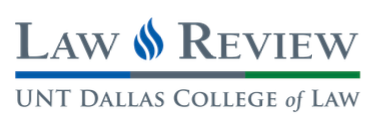Two UNT Dallas Law Review Publications Offer Expert Insight and Analysis
January 19, 2024
The workings of the American legal system can be challenging, to say the least, whether you work in the profession or not. It is especially daunting for outsiders unfamiliar with the complex web of processes, rules and jurisdictions. Not to mention the latest precedent-setting decisions and established case law. Yet, almost everyone will be affected by our legal and judicial systems at some point in their life.

With that in mind, the UNT Dallas College of Law aims to inform attorneys and other legal practitioners, as well as laymen, by publishing relevant, timely and impactful content in the UNT Dallas Law Review. It circulates two student-led digital publications, On the Cusp and Accessible Law.
“It is the mission of the UNT Dallas Law Review to improve legal comprehension and access for all people touched by or engaged in the practice of law,” said Sonia Gonzalez, CEO of UNT Dallas Law Review.

The most recent edition of On the Cusp tackles two different angles on the topic of restrictions: how states are making it difficult or impossible for women to obtain abortions and how the federal government is creating roadblocks for Iranians trying to travel or emigrate to the U.S.
Accessible Law, in its latest edition titled The Civil Rights Issue, also takes a deep dive on abortion, with an explanation of the patchwork of laws and regulations in Texas and their impact even beyond our state borders. Also on the docket: workplace protections for pregnant women, guidance for navigating wrongful death claims, how far is too far when it comes to school discipline, and why Texas’s Operation Lone Star, a crackdown on illegal immigration, has led to false imprisonment.
These articles are meticulously researched and thoughtfully presented. They provide valuable insight, expert context and perspective, and actionable advice.
“I am thankful for each student who has stepped up to be on Law Review,” said Gonzalez. “Despite the demanding nature of participating, our members understand how fruitful this experience can be as a student and as a future practitioner.”

On the Cusp and Accessible Law launched in 2017, just a few years after the UNT Dallas College of Law opened. On the Cusp provides concise journal publications designed to keep legal practitioners well-informed of contemporary changes on various legal topics and fields of interest with a focus on how those changes impact day-to-day legal practice. On the Cusp articles are written primarily by external contributors such as practitioners, professors and judges.
Accessible Law promotes access to the legal system by connecting members of the public to information, materials and various other media that may assist them in making informed and practical decisions in their legal affairs. Content, including articles, infographics, and other multimedia, is developed by external contributors and students in the form of comments and notes to present complex legal concepts in an accessible format.

Both digital publications are completely managed and operated by UNT Dallas College of Law students under the guidance of faculty advisor Professor Loren Jacobson. Membership in Law Review is by invitation only, and selection of student members is based on application and satisfaction of eligibility criteria, including completion of first-year law courses with a required GPA.
In addition to having the opportunity to write comments or notes, law student members of On the Cusp, or Staff Editors, assist with the acquisition, contribution, editing and publication of articles. Law student members of Accessible Law, or Staff Reporters, assist with the acquisition, creation, editing and preparation of multimedia content.

“Being part of Law Review has allowed me to grow both professionally and personally as I have gained knowledge of substantive law, developed management skills, matured as a leader and improved my writing,” Gonzalez shared.
She is among a team of 26 who proudly produce the two publications circulated by the UNT Dallas Law Review. They are all committed to shining a light on and opening eyes to our legal system, including its benefits and faults. All with a shared purpose of providing content that is beneficial, transparent and memorable for all who read it.